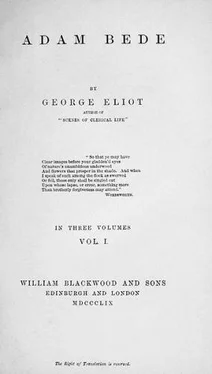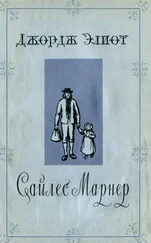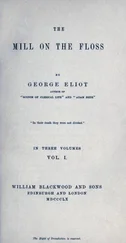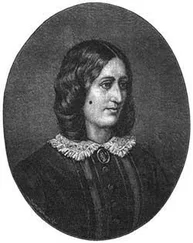"It's wonderful," he thought, "how that sound goes to one's heart almost like a funeral bell, for all it tells one o' the joyfullest time o' the year, and the time when men are mostly the thankfullest. I suppose it's a bit hard to us to think anything's over and gone in our lives; and there's a parting at the root of all our joys. It's like what I feel about Dinah. I should never ha' come to know that her love 'ud be the greatest o' blessings to me, if what I counted a blessing hadn't been wrenched and torn away from me, and left me with a greater need, so as I could crave and hunger for a greater and a better comfort."
He expected to see Dinah again this evening, and get leave to accompany her as far as Oakbourne; and then he would ask her to fix some time when he might go to Snowfield, and learn whether the last best hope that had been born to him must be resigned like the rest. The work he had to do at home, besides putting on his best clothes, made it seven before he was on his way again to the Hall Farm, and it was questionable whether, with his longest and quickest strides, he should be there in time even for the roast beef, which came after the plum pudding, for Mrs. Poyser's supper would be punctual.
Great was the clatter of knives and pewter plates and tin cans when Adam entered the house, but there was no hum of voices to this accompaniment: the eating of excellent roast beef, provided free of expense, was too serious a business to those good farm-labourers to be performed with a divided attention, even if they had had anything to say to each other — which they had not. And Mr. Poyser, at the head of the table, was too busy with his carving to listen to Bartle Massey's or Mr. Craig's ready talk.
"Here, Adam," said Mrs. Poyser, who was standing and looking on to see that Molly and Nancy did their duty as waiters, "here's a place kept for you between Mr. Massey and the boys. It's a poor tale you couldn't come to see the pudding when it was whole."
Adam looked anxiously round for a fourth woman's figure, but Dinah was not there. He was almost afraid of asking about her; besides, his attention was claimed by greetings, and there remained the hope that Dinah was in the house, though perhaps disinclined to festivities on the eve of her departure.
It was a goodly sight — that table, with Martin Poyser's round good-humoured face and large person at the head of it helping his servants to the fragrant roast beef and pleased when the empty plates came again. Martin, though usually blest with a good appetite, really forgot to finish his own beef to-night — it was so pleasant to him to look on in the intervals of carving and see how the others enjoyed their supper; for were they not men who, on all the days of the year except Christmas Day and Sundays, ate their cold dinner, in a makeshift manner, under the hedgerows, and drank their beer out of wooden bottles — with relish certainly, but with their mouths towards the zenith, after a fashion more endurable to ducks than to human bipeds. Martin Poyser had some faint conception of the flavour such men must find in hot roast beef and fresh-drawn ale. He held his head on one side and screwed up his mouth, as he nudged Bartle Massey, and watched half-witted Tom Tholer, otherwise known as "Tom Saft," receiving his second plateful of beef. A grin of delight broke over Tom's face as the plate was set down before him, between his knife and fork, which he held erect, as if they had been sacred tapers. But the delight was too strong to continue smouldering in a grin — it burst out the next instant in a long-drawn "haw, haw!" followed by a sudden collapse into utter gravity, as the knife and fork darted down on the prey. Martin Poyser's large person shook with his silent unctuous laugh. He turned towards Mrs. Poyser to see if she too had been observant of Tom, and the eyes of husband and wife met in a glance of good-natured amusement.
"Tom Saft" was a great favourite on the farm, where he played the part of the old jester, and made up for his practical deficiencies by his success in repartee. His hits, I imagine, were those of the flail, which falls quite at random, but nevertheless smashes an insect now and then. They were much quoted at sheep-shearing and haymaking times, but I refrain from recording them here, lest Tom's wit should prove to be like that of many other bygone jesters eminent in their day — rather of a temporary nature, not dealing with the deeper and more lasting relations of things.
Tom excepted, Martin Poyser had some pride in his servants and labourers, thinking with satisfaction that they were the best worth their pay of any set on the estate. There was Kester Bale, for example (Beale, probably, if the truth were known, but he was called Bale, and was not conscious of any claim to a fifth letter), the old man with the close leather cap and the network of wrinkles on his sun-browned face. Was there any man in Loamshire who knew better the "natur" of all farming work? He was one of those invaluable labourers who can not only turn their hand to everything, but excel in everything they turn their hand to. It is true Kester's knees were much bent outward by this time, and he walked with a perpetual curtsy, as if he were among the most reverent of men. And so he was; but I am obliged to admit that the object of his reverence was his own skill, towards which he performed some rather affecting acts of worship. He always thatched the ricks — for if anything were his forte more than another, it was thatching — and when the last touch had been put to the last beehive rick, Kester, whose home lay at some distance from the farm, would take a walk to the rick-yard in his best clothes on a Sunday morning and stand in the lane, at a due distance, to contemplate his own thatching walking about to get each rick from the proper point of view. As he curtsied along, with his eyes upturned to the straw knobs imitative of golden globes at the summits of the beehive ricks, which indeed were gold of the best sort, you might have imagined him to be engaged in some pagan act of adoration. Kester was an old bachelor and reputed to have stockings full of coin, concerning which his master cracked a joke with him every pay-night: not a new unseasoned joke, but a good old one, that had been tried many times before and had worn well. "Th' young measter's a merry mon," Kester frequently remarked; for having begun his career by frightening away the crows under the last Martin Poyser but one, he could never cease to account the reigning Martin a young master. I am not ashamed of commemorating old Kester. You and I are indebted to the hard hands of such men — hands that have long ago mingled with the soil they tilled so faithfully, thriftily making the best they could of the earth's fruits, and receiving the smallest share as their own wages.
Then, at the end of the table, opposite his master, there was Alick, the shepherd and head-man, with the ruddy face and broad shoulders, not on the best terms with old Kester; indeed, their intercourse was confined to an occasional snarl, for though they probably differed little concerning hedging and ditching and the treatment of ewes, there was a profound difference of opinion between them as to their own respective merits. When Tityrus and Meliboeus happen to be on the same farm, they are not sentimentally polite to each other. Alick, indeed, was not by any means a honeyed man. His speech had usually something of a snarl in it, and his broad-shouldered aspect something of the bull-dog expression—"Don't you meddle with me, and I won't meddle with you." But he was honest even to the splitting of an oat-grain rather than he would take beyond his acknowledged share, and as "close-fisted" with his master's property as if it had been his own — throwing very small handfuls of damaged barley to the chickens, because a large handful affected his imagination painfully with a sense of profusion. Good-tempered Tim, the waggoner, who loved his horses, had his grudge against Alick in the matter of corn. They rarely spoke to each other, and never looked at each other, even over their dish of cold potatoes; but then, as this was their usual mode of behaviour towards all mankind, it would be an unsafe conclusion that they had more than transient fits of unfriendliness. The bucolic character at Hayslope, you perceive, was not of that entirely genial, merry, broad-grinning sort, apparently observed in most districts visited by artists. The mild radiance of a smile was a rare sight on a field-labourer's face, and there was seldom any gradation between bovine gravity and a laugh. Nor was every labourer so honest as our friend Alick. At this very table, among Mr. Poyser's men, there is that big Ben Tholoway, a very powerful thresher, but detected more than once in carrying away his master's corn in his pockets — an action which, as Ben was not a philosopher, could hardly be ascribed to absence of mind. However, his master had forgiven him, and continued to employ him, for the Tholoways had lived on the Common time out of mind, and had always worked for the Poysers. And on the whole, I daresay, society was not much the worse because Ben had not six months of it at the treadmill, for his views of depredation were narrow, and the House of Correction might have enlarged them. As it was, Ben ate his roast beef to-night with a serene sense of having stolen nothing more than a few peas and beans as seed for his garden since the last harvest supper, and felt warranted in thinking that Alick's suspicious eye, for ever upon him, was an injury to his innocence.
Читать дальше











